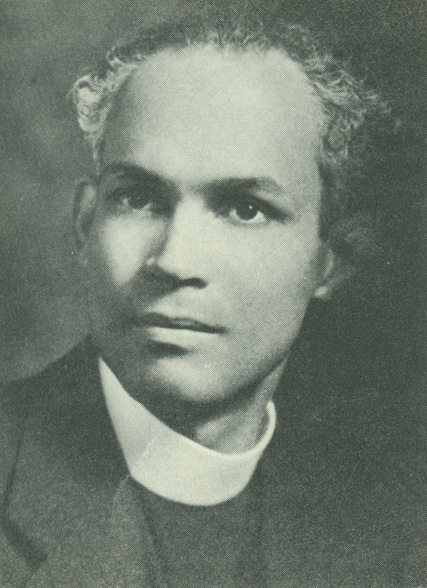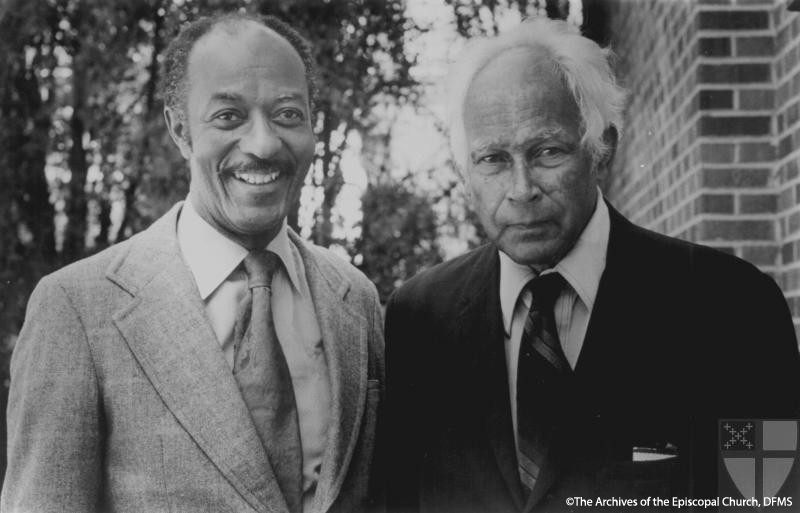Leadership Gallery
The Reverend Kenneth de Poullain Hughes, 1902-1978
Kenneth de Poullain Hughes was born in the Caribbean island nation of Grenada on March 29, 1902. During the forty-four years of his ministry as an Episcopal priest, he served as a committed and outspoken advocate for racial improvement within the Church and the broader communities of which he was a part. The trajectory of his ministry spanned many turbulent decades in which the United States and the Episcopal Church confronted racial injustice and Civil Rights’ reforms.
Hughes received his Bachelor of Arts at the City College of New York in 1929 and completed his seminary work at the General Theological Seminary in 1936. He was called to serve as Rector at Saint Mark’s Church in Charleston, South Carolina in 1936 and served the first five years of his ministry there. Hughes was confronted in Charleston with many forms of racial intolerance and prejudice. Saint Mark’s was the only church in the Diocese of South Carolina that was not considered “in communion” with the Convention, and Hughes was one of six priests in the diocese that was not allowed a seat or voice at the annual diocesan convention. All six of these priests were associated with traditionally African-American parishes. Although Saint Mark’s had sought recognition by the diocese multiple times since its founding in 1866, Hughes would not see his church fully accepted by the diocese during his service as rector.
In January 1940 Hughes assumed duties as the Rector of Saint Bartholomew’s Church in Cambridge, Massachusetts. He served the remainder of his active ministry at this church, until his retirement in 1970. He also married Constance Elaine Moon in Cambridge with whom he had three children. Although working outside of the American South, Hughes discovered that racial prejudice proved to be a factor in his ministry in Cambridge just as it had in South Carolina. Hughes soon began to publicly challenge racial segregation within the Church and society. He wrote several articles for The Witness, where he described the unequal nature of racial segregation this way: “the mere fact that [the black parishioner] was separated was a limitation of his freedom and implied his inferiority and the superiority of his separators.” Hughes articulated how segregation undermined Christian unity and how the practices of many Christians were at odds with the purported values of the Church.
Hughes presided over considerable improvements to his church, including the relocation of Saint Bartholomew’s to Harvard Street into a building formerly occupied by the First Methodist Episcopal Society. The new church building allowed for more parishioners and provided much-improved parish house facilities. The new church was consecrated on November 9, 1941, and inaugurated a period of important growth for the congregation. Saint Bartholomew’s was soon admitted as a parish of the Diocese of Massachusetts in 1945, under the guidance of then Bishop Henry Knox Sherrill.
The Rev. Kenneth de Poullain Hughes, keynote speaker for the Conference on Minority Recruitment and Equal Opportunity Employment, is pictured with Mr. William Rucker (on the right), chairman of the Conference.
Hughes was a founder of the Union of Black Episcopalians, an organization that evolved from an earlier coalition of African-American clergy to promote racial improvement in the Church. In 1962 he was the recipient of the Bishop Norman B. Nash Fellowship of the Diocese of Massachusetts, an honor which enabled him to travel to several African countries to experience the Church’s work in that part of the world. Following his retirement in 1970, Hughes remained active and was recognized for his continued advocacy against racial injustice. He served as the distinguished keynote speaker at the Committee on Minority Recruitment and Equal Opportunity Employment conference in 1977. In his remarks, Hughes noted that “The Church is trying to correct past injustices and to enter into the 21st century…For that, I am thankful.”
Kenneth de Poullain Hughes worked diligently as an advocate for positive change within the Episcopal Church and American society. He passed away March 31, 1978. [Sources]



